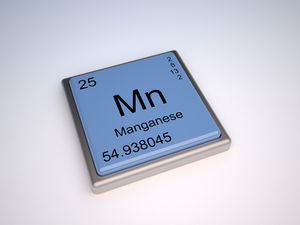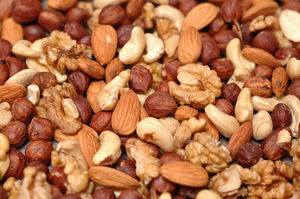Manganese
| See Also | Minerals |
|---|
Manganese is an essential mineral. It serves an important role in several enzyme reactions including those involved in blood sugar control, energy metabolism, thyroid hormone function, and in the antioxidant enzyme, superoxide dismutase (SOD). SOD serves a critical role in protecting cellular components from super oxide free radical damage, therefore manganese supplementation increases antioxidant activity in the body by boosting the activity of the superoxide dismutase enzyme [1].
Contents
Food Sources
The following foods have the highest concentration of manganese. For a more expansive list on food sources of specific nutrients visit Health Canada's Dietary Reference Intakes for Elements or USDA's National Nutrient Database
Other food sources include:[2]
- grains: whole grains
- protein sources: nuts
- vegetables: green leafy vegetables
- fruit: dried fruits
Uses
The following is a list of the primary uses for manganese. [3], [1].
- Strains and sprains, and Inflammation: Manganese increases the activity of super oxide dismutase and therefore is commonly used for strains and sprains, and inflammation. Injectable forms are also used for inflammation associated with rheumatoid arthritis.
- Cerebral Function: Manganese is a critical co-factor for glucose utilization in brain cells/neurons. This may exert some antidepressant properties.
- Epilepsy: Low manganese has also been linked to epilepsy, in fact, the lower an individual's manganese levels are, the higher the seizure activity. Manganese supplementation and/or increased manganese in the diet may be helpful in treating epilepsy.
- Diabetes: Manganese is a cofactor in the key enzymes of glucose metabolism and is found to be deficient in diabetics. Supplementation with manganese appears to be an appropriate part of a comprehensive treatment plan for diabetics, especially for those not responding to insulin therapy.
- HIV: New research as found that manganese can inhibit the enzyme which allows HIV to process its genetic information in reverse, thus controlling its replication. Manganese levels must be very high in the blood and therefore one must be monitored closely to prevent manganese toxicity.
- Tardive Dyskinesia: 25% of patients on tranquilizing medication will suffer from this disorder which is a result of tranquilizer toxicity. It is motor disorder that is often irreversible. These medications cause a manganese deficiency.
Deficiency Symptoms
Manganese deficiency in humans is not as well defined as it is for animals. According to animal studies, deficiency could lead to deleterious effects on growth and metabolism. Studies done on humans have shown that deficiency can lead to metabolic abnormalities including skin rashes, loss of hair colour, bone remodelling, reduced growth of hair and nails, and reduced HDL cholesterol [1].
Excess Symptoms
Dietary and supplemental manganese have a very low risk of toxicity associated with them. Environmental sources of manganese, on the other hand, are of more concern. Toxicity can lead to what is called "manganese madness" which is characterized by severe psychiatric symptoms such as [1]:
- hallucinations
- violent acts
- hyperirritability
Assessment Procedure
Best Specimens to Collect:[4]
- RBC Manganes - a low level indicates a deficiency
- Hair Mineral Analysis - a low level indicates a deficiency
Prescribing Considerations
- Manganese bound to picolinate, gluconate, or other chelates are generally better tolerated than manganese salts such as manganese sulfate or chloride [1].
- The recommended dosages varies based on age and health status. To determine what your specific requirements are talk to your naturopathic doctor or other trained medical professional. There is no official RDA for manganese. Here are the estimated safe and adequate ranges.
- Infant: 0.3-0.6mg (under 6 months); 0.6-1.0mg (6-12 months)
- Child: 1.0-1.5mg (1-3 years); 1.5-2.0mg (4-6 years); 2.0-3.0mg (7-10 years)
- Adolescent - Adult (11+ years): 2.5-5.0mg
Safety
- General Adverse Reactions: Oral supplementation of manganese is generally well tolerated. It may, however, be neurotoxic in those with liver failure. Manganese may also be toxic for others, namely miners, leading to "manganese madness" which in the later stages, has similar symptoms to Parkinson's disease. There are also a few case reports of individuals getting manganese intoxication when receiving long-term total parenteral nutrition. They developed parkinsonism and were treated with levodopa [5].
- Pregnancy and Breastfeeding: Should avoid intake above the upper limit of the estimated safe and adequate daily dietary intake which is 2.0-5.0mg daily.
- Contraindications: It is thought that manganese may play a role in the hepatic encephalopathy in those with liver failure.
Drug Interactions
- Addresses Drug-Induced Deficiency:
- *Antacids - Antacids may inhibit the absorption of manganese.
- Laxatives - Magnesium-containing laxatives may decrease the absorption of manganese if taken concomitantly.
- Tetracycline - Drug may reduce absorption of manganese if taken concomitantly.
Nutrient Interactions
- Nutrient Interactions include: [1]
- Foods:
- Concomitant intake of manganese with foods rich in phytic acid (unleavened bread, raw beans, seeds, nuts, and grains and soy isolates) or oxalic acid (spinach, sweet potatoes, rhubarb, and beans) may depress the absorption of manganese.[5]
References
- ↑ 1.0 1.1 1.2 1.3 1.4 1.5 1.6 Murray Michael T (2005) Encyclopedia of Nutritional Supplements, The Essential Guide for Improving Your Health Naturally, Prima Publishing
- ↑ Medlineplus [1]
- ↑ Hoffer Abram, Prousky Jonathan (2006) Naturopathic Nutrition, A Guide to Nutrient-Rich Food & Nutritional Supplements for Optimum Health, CCNM Press
- ↑ Bralley J Alexander and Lord Richard S (2005) Laboratory Evaluations in Molecular Medicine, Nutrients, Toxicants, and Cell Regulators Institute for Advances in Molecular Medince, GA
- ↑ 5.0 5.1 5.2 Hendler Sheldon S., Rorvik David (Editors) (2008) PDR for Nutritional Supplements, Medical Economics Company Inc.

